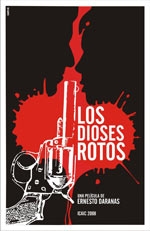 “Nuestro objetivo final es nada menos que lograr la integración del cine latinoamericano.
Así de simple, y así de desmesurado”.
“Nuestro objetivo final es nada menos que lograr la integración del cine latinoamericano.
Así de simple, y así de desmesurado”.
Gabriel García Márquez
Presidente (1927-2014)


-

Los dioses rotos del cubano Ernesto DaranasPor Rolando Pérez BetancourtA la manera de una bien llevada tragedia griega, sin dejar a un lado uno solo de sus componentes, arrastrando en su transcurrir narrativo la certeza por parte del espectador de que la muerte violenta será el sello purificador de tanta malaventura, Los dioses rotos corona con muy buenos resultados la llegada de Ernesto Daranas a los dominios del largometraje, y con él, el equipo que lo acompañó, incluyendo los actores.
De nuevo el insepulto Yarini, aquel gallo de San Isidro, vuelve a dar guerra en este paralelismo social y cultural contemporáneo de chulos y prostitutas, y también de mujeres que, lejos de serlo, sucumben ante el rigor sensual del macho, que tal expresión (¡horror!) pareciera surgida de la más burda mentalidad machista, pero es una tesis oblicua del filme, no importa que la profesora universitaria que investiga sobre el asunto (Silvia Águila) resulte seducida por el joven proxeneta (Carlos Ever Fonseca) bajo una explicación formal de que "fue drogada". No señor. Hubo algo más en esa entrega carnal y el director lo subraya, tanto en las imágenes del descoque, como en la desesperación final de "la víctima".
Daranas conoce bien el tema, localizable en meandros marginales de nuestra sociedad, y lo despliega por dos caminos, el melodrama, inventado por él mismo, y el tono de encuesta documental que, a partir de las entrevistas de la profesora con las llamadas jineteras, nos parece estar presenciando.
Para algunos, ese submundo tiene mucho de revelador, pero en él se dan las más ancestrales reiteraciones del oficio, desde la explotación despiadada de la carne en alquiler, hasta códigos de hombría que es necesario cumplir si se quiere seguir viviendo con el respeto imprescindible.
Aunque se trata de una historia contemporánea, la dirección de arte, la escenografía y el excelente trabajo de cámara y montaje se las arreglan para tejer una atmósfera prácticamente sin tiempo. De ahí que casi todos los vehículos que aparecen sean de los años cincuenta y las calles y vetustas edificaciones del legendario San Isidro den la impresión de guardar todavía la elegante pisada de Alberto Yarini, allá a comienzos del 1900.
Como todo melodrama que se respete, hay puntos previsibles y algún que otro tono altisonante, pero todo dentro de una coherencia narrativa que se apoya en las actuaciones (muy bien también Héctor Noas como el gigoló con mucho oficio y respetado en el ambiente, y esa bella revelación que ya es Annia Bú Maure, en el papel de la prostituta apasionada y sentimental que da pie a la tragedia).
 Los dioses rotos by the Cuban Ernesto Daranas
Los dioses rotos by the Cuban Ernesto Daranas
By Rolando Pérez Betancourt
In the way of a well staged ancient Greek tragedy, without omitting any one of its components, implying in its narrative the viewer’s certainty that a violent death will be the purifying sign of so much misfortune; Los dioses rotos crowns with very good results, Ernesto Daranas’s arrival to the realm of the feature length film together with his accompanying team and actors.
Yarini unburied again, the rooster of San Isidro, who fights again in this contemporary social and cultural parallelism of pimps and prostitutes, and women who, far from being so, succumb to the oblige sensuality of the man, such an expression (what a terrible thing!) seem to emerge from the coarsest macho mentality, but this is an slantwise thesis of the film. It is of no aid to advance the formal explanation that the university professor who studies the subject (Silvia Aguila) was seduced by the young pimp (Carlos Ever Fonseca) because she was drugged." No sir!. There was something else in that carnal surrender and the director stresses it, both in the images of the surrenders, as in the final desperation of "the victim."Daranas knows very well the theme that it is present in the marginal meandering of our society, and displayed it in two ways, using the melodrama, created by him, and the tone of documentary film survey which is based on interviews with the teacher to call prostitutes, which we seem to be witnessing.
For some people may result much revealing, but in it take place the most ancient iterations of the trade, from the ruthless exploitation of the body to codes of masculinity that must be obeyed if one wants to continue living with the necessary respect.
Although this is a contemporary story, the art direction, the set design and the excellent camera work are set to weave a virtually out of time atmosphere. Hence, almost all vehicles displayed are from the 1950s, and the streets and dilapidated buildings of the legendary San Isidro neighborhood seems to still keep the elegant footprint of Alberto Yarini’s steps, back at the beginning of 1900.
As any well contrived melodrama, there are predictable moments and some other high-pitching tone, but all within a coherent narrative that relies on the performances (very well too Héctor Noas as the experienced and respected gigolo, and that beautiful revelation that is Annia Bú Maure, in the role of the passionate and sentimental prostitute who unchained the tragedy).
(Fuente: Granma)
















